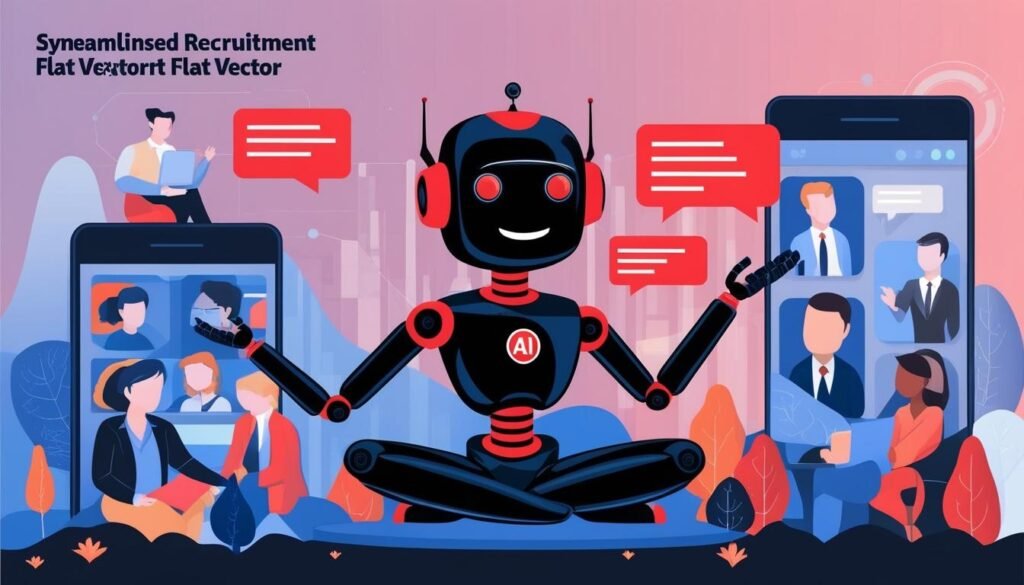Artificial intelligence is revolutionising recruitment processes, making talent acquisition more efficient and effective for employers.
Artificial intelligence (AI) is increasingly transforming the realm of human resources, particularly within the scope of talent acquisition. The adoption of AI tools is facilitating more efficient recruitment processes, saving time and resources for human resources and recruitment professionals. This shift is underscored by research findings and emerging practices that showcase how AI can streamline candidate screening, improve job advertisement reach, enhance communication with potential candidates, and expedite interview scheduling.
The process of identifying suitable candidates from a vast pool of applicants can be challenging and labor-intensive. Many professionals are now leveraging AI-driven algorithms to streamline this aspect of recruitment by focusing on specific criteria, such as educational qualifications, language proficiency, previous work experience, and professional credentials. A study from an AI-powered resume screening tool indicates that 76 percent of employers are adopting skills-based hiring strategies. Additionally, nearly 55 percent of employers utilise role-based skills tests in their recruitment processes. These AI tools not only facilitate faster candidate filtering but also help in identifying individuals who meet precise job requirements, offering significant advantages over traditional evaluation methods.
As job seekers increasingly turn to social media and online platforms for employment opportunities, it has become essential for recruiters to adapt their outreach strategies. Data suggests that 30 percent of employers are employing AI technology to compose job descriptions, while 28 percent utilise it for crafting social media posts. While AI generates content more rapidly, allowing recruiters to devote time to other areas, it is crucial that users thoroughly proofread this material to mitigate the risk of disseminating misinformation.
Moreover, many potential candidates have pressing questions about job roles prior to applying, which is often compounded by the fact that such inquiries occur outside traditional working hours. A case study involving a trucking company demonstrated that implementing a chatbot customised to address candidates’ concerns—using demographic and geographic data—yielded a significant engagement rate, with 38 percent of those interacting with the chatbot proceeding to apply for open positions. Monitoring engagement metrics is essential for recruiters to gauge the effectiveness of AI solutions and to refine their approach as necessary.
Interview scheduling remains a critical yet often cumbersome aspect of the hiring process. Research conducted in 2024 revealed that talent acquisition teams spend approximately 35 percent of their time on this task. However, a staggering 99 percent of recruitment professionals are now utilising AI and automation to enhance scheduling efficiency. Current solutions include chatbot functionalities that enable candidates to select suitable interview times, thereby streamlining the coordination process. These tools also maintain a log of communication, allowing both applicants and recruiters to revisit prior discussions easily.
Recruitment agencies are thus exploring various ways to integrate AI into their talent acquisition strategies, with the goal of enhancing operational productivity. Familiarising oneself with ongoing advancements in AI technology, both within and beyond recruitment, can inspire the identification of innovative applications tailored to specific organisational needs.
As businesses navigate the evolving landscape of AI in talent acquisition, it will be beneficial to maintain a flexible approach, evaluating potential alternatives that may be more suited to the unique circumstances of each company and its candidates.
Source: Noah Wire Services
- https://www.shrm.org/topics-tools/news/talent-acquisition/shrm-2024-talent-acquisition-trends-genai-skills-based-hiring – Corroborates the adoption of AI tools in talent acquisition, including their use in generating job descriptions, drafting candidate outreach, and enhancing the overall efficiency of the recruiting process.
- https://www.carv.com/blog/ai-recruitment-statistics-for-recruiters-and-staffing-agencies – Supports the use of AI in candidate sourcing, screening, and engagement, as well as its impact on time-to-fill ratios, interview show rates, and the overall efficiency of the hiring process.
- https://www.carv.com/blog/ai-recruitment-statistics-for-recruiters-and-staffing-agencies – Provides statistics on recruiter confidence in AI for candidate sourcing, screening, and engagement, and highlights the time-saving benefits and improved candidate quality achieved through AI.
- https://teambuildersearch.com/the-future-of-talent-acquisition-trends-shaping-2024-and-beyond/ – Discusses the role of AI and automation in hiring, including streamlining candidate screening, reducing bias, and improving the efficiency of the hiring process.
- https://teambuildersearch.com/the-future-of-talent-acquisition-trends-shaping-2024-and-beyond/ – Highlights how AI can reduce bias in the hiring process by analyzing candidate data objectively and anonymizing resumes.
- https://ellow.io/top-ai-in-hiring-statistics/ – Supports the efficiency gains of AI in hiring, including its capability to save time and streamline hiring processes, as well as its value in candidate sourcing.
- https://www.shrm.org/topics-tools/news/talent-acquisition/shrm-2024-talent-acquisition-trends-genai-skills-based-hiring – Explains the growing trend of skills-based hiring and how AI is being used to upskill and reskill internal talent, addressing the skills gap.
- https://www.carv.com/blog/ai-recruitment-statistics-for-recruiters-and-staffing-agencies – Details the use of AI in composing job descriptions and social media posts, and the importance of proofreading AI-generated content.
- https://www.carv.com/blog/ai-recruitment-statistics-for-recruiters-and-staffing-agencies – Provides a case study on the use of chatbots for candidate engagement and their impact on application rates.
- https://ellow.io/top-ai-in-hiring-statistics/ – Highlights the efficiency of AI in interview scheduling, including the use of chatbots to streamline the coordination process.
- https://teambuildersearch.com/the-future-of-talent-acquisition-trends-shaping-2024-and-beyond/ – Emphasizes the importance of adapting to AI advancements and maintaining a flexible approach to integrate AI into talent acquisition strategies.


